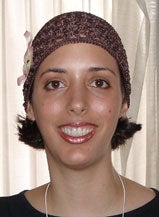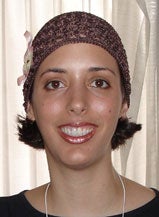 KINGSTON, R.I.—Feb. 1, 2016—Sugar is sweet, but it’s also fascinating, at least to scientists. Now high school girls in Rhode Island will also have a chance to learn more about the white stuff.
KINGSTON, R.I.—Feb. 1, 2016—Sugar is sweet, but it’s also fascinating, at least to scientists. Now high school girls in Rhode Island will also have a chance to learn more about the white stuff.
Mindy Levine, an assistant professor of chemistry at the University of Rhode Island, is offering a one-day class about the chemistry of sugar Wednesday, Feb. 17, from 9 a.m. to 4 p.m., on the Kingston campus. It’s the program’s first year.
Girls will make their own rock candy, study the amount of sugar in soft drinks and separate candies based on chromatography (the separation of mixtures). They’ll also investigate what happens when gummy bears come into contact with certain chemicals, and they’ll make ice cream with liquid nitrogen. Oh, they get to eat it too.
“It’s a fun and challenging day,” says Levine. “We encourage girls to sign up.” So far, 22 have registered, and Levine says she has room for 50. Register
The recipient of a 2016 Rising Star Award from the American Chemical Society, Levine has been speaking out for years about the importance of educating high school girls about chemistry and careers in science.
Her annual chemistry camp in April is packed with girls learning about everything from the chemistry of bubbles to forensic investigations using lipstick. This year, Pfizer and Shimadzu Scientific Instruments are supporting the camp; Sugar Science Day is funded as part of a five-year grant from the National Science Foundation.
Research shows that girls start losing interest in science in middle school and, in some cases, even earlier. That results in few women pursuing careers in science, technology, engineering and math, Levine says.
At the top 50 research universities in the United States, only 18 percent of tenured and tenure-track positions were held by females in 2012, she says. This gender gap may start as early as elementary school, with girls having a more negative attitude toward science than males.
Levine attributes the gap to many causes: a lack of female scientists as role models, which contributes to a child’s perception that scientists are overwhelmingly men; girls’ belief that they don’t have the aptitude and ability to succeed in science, math, technology and engineering; and reinforcement of these stereotypes by teachers, parents and others in authority.
Levine is determined to show girls that science is fun, challenging and accessible.
“For too long girls and women have been held back in science by a variety of internal and external factors,” she says. “Programs like Sugar Science Day provide high school girls with hands-on experience and interaction with other female scientists who are role models for what it means to be a female in a heavily male-dominated field.”
Levine is one of those role models. She received her undergraduate and graduate degrees from Columbia University and did post-doctoral training at the Massachusetts Institute of Technology. She is an expert in synthetic organic chemistry, with a focus on how chemicals communicate with each other when they’re not attached. Through her research, she’s developing medical diagnostic tools and sensors for detecting toxins.
“I was fortunate. I had strong female scientist role models who encouraged and supported me at every stage in my career,” she says. “My dream is to be able to provide encouragement and reinforcement for all girls at all levels to pursue the careers of their dreams.”
Pictured above: Mindy Levine, an assistant professor of chemistry at the University of Rhode Island.
Photo courtesy of Mindy Levine.

